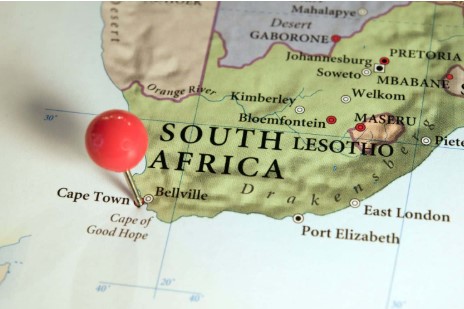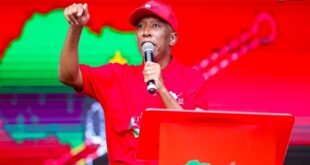
In 2025, a bold proposal to rename South Africa the “Republic of Azania” is heading to Parliament, stirring passionate discussions about national identity, colonial legacy, and cultural heritage. Led by the African Transformation Movement (ATM), this initiative argues that “South Africa” is a colonial label imposed by British and Boer settlers, lacking authentic African roots.
What Is the Azania Proposal?
The African Transformation Movement (ATM), under President Vuyo Zungula, is pushing to rename South Africa the “Republic of Azania” as part of broader constitutional reforms. The party argues that “South Africa,” established during the 1910 Union of South Africa, is a colonial descriptor tied to British and Boer rule, failing to reflect the nation’s African identity. ATM spokesperson Zama Ntshona emphasized that the country should be “more than just a direction” at Africa’s southern tip. The proposal, supported by groups like the Pan Africanist Congress (PAC) and EFF, will be submitted to Parliament and the Constitutional Review Committee, sparking a national conversation.
The Historical Roots of “Azania”
The term “Azania” has deep historical significance. Used by ancient Greeks to describe the southeast African coast, it was later adopted by anti-apartheid liberation movements like the PAC and Black Consciousness Movement as a symbol of pre-colonial African identity. Supporters view it as a rejection of apartheid and colonial legacies, aligning with efforts to decolonize place names since 1994. However, critics argue that “Azania” is more closely tied to East African regions like Somalia and Kenya, lacking broad cultural or linguistic grounding in South Africa. This historical disconnect fuels searches for “Azania debate” and “South Africa rename history.”
Arguments For and Against the Name Change
Supporters’ Perspective: The ATM and its allies argue that renaming South Africa to Azania is a vital step toward decolonization, reclaiming an African identity free from colonial baggage. They see it as part of a broader reform agenda, including land redistribution and judicial restructuring, to address historical injustices. On X, supporters like @ATMovement_SA call Azania “the land of Black people given by God,” reflecting a vision of cultural empowerment.
Critics’ Perspective: Political analyst Kenneth Mokgatlhe dismisses the proposal as “ideological theatre,” arguing that “South Africa” is a neutral geographic label, akin to North Korea or East Timor. He notes that “Azania” lacks widespread public support, being primarily used by academic and radical political circles. Some X users, like @NadiaFerreira85, raise concerns about the term’s association with Arab enslavement in East Africa, questioning its suitability. The constitutional amendment process, requiring a two-thirds parliamentary majority and public consultation, adds further complexity.
Public and Political Reactions
The proposal has ignited polarized reactions. On X, posts range from enthusiastic support for decolonization to skepticism about practicality and historical relevance. For instance, @AfricaFirsts highlights the ATM’s aim to reflect the country’s true identity, while @san247365 notes Azania’s pre-colonial roots. Conversely, critics argue it diverts attention from pressing issues like economic challenges or political scandals, such as those involving President Ramaphosa or cabinet members. The debate aligns with ongoing efforts to rename colonial-era landmarks, but renaming the entire country is a far more divisive step, driving searches for “South Africa rename Azania.”
Key Information on the Azania Proposal
The table below summarizes key details about the proposal to rename South Africa, addressing trending search queries.
| Category | Details |
|---|---|
| Proposal | Rename South Africa to Republic of Azania |
| Proponents | African Transformation Movement (ATM), PAC, EFF |
| Rationale | Decolonization, reclaiming African identity |
| Critics’ View | Lacks public support, historical disconnect, ideological focus |
| Process | Constitutional amendment, two-thirds parliamentary majority, public consultation |
| Search Trends | “South Africa rename Azania,” “Azania debate,” “decolonization South Africa” |
| Challenges | Lack of consensus, historical relevance, legislative hurdles |
Note: The proposal’s progress depends on parliamentary and public support.
The Road Ahead for the Azania Proposal
Renaming South Africa would require a two-thirds majority in Parliament and extensive public consultation, a process likely to face significant hurdles given the lack of consensus. While the ATM frames it as a step toward decolonization, critics argue it may distract from urgent issues like economic inequality or political accountability. The debate reflects broader tensions about South Africa’s identity 31 years after apartheid’s end, with 80% of place name changes since 1994 targeting colonial or apartheid-era titles. Searches for “decolonization South Africa” are expected to rise as the discussion unfolds.
Join the Azania Debate
The proposal to rename South Africa the Republic of Azania is a pivotal moment in the nation’s history, sparking questions about identity, heritage, and progress. Follow updates on X or subscribe to our blog for the latest insights. What’s your view on renaming South Africa? Share your thoughts in the comments!
Frequently Asked Questions
1. What is the proposal to rename South Africa?
The African Transformation Movement (ATM) is proposing to rename South Africa the Republic of Azania to reject its colonial legacy.
2. Why is “South Africa” considered a colonial name?
“South Africa” was established during the 1910 Union of South Africa by British and Boer colonizers, seen as lacking African cultural significance.
3. What is the historical significance of “Azania”?
“Azania” was used by ancient Greeks for the southeast African coast and adopted by anti-apartheid movements as a symbol of African identity.
4. Who supports the Azania proposal?
The ATM, Pan Africanist Congress (PAC), and EFF support the proposal, viewing it as a decolonization effort.
5. Why is the proposal controversial?
Critics argue “Azania” lacks broad public support and historical relevance to South Africa, with some linking it to East African history.
6. What is required to rename South Africa?
A constitutional amendment with a two-thirds parliamentary majority and public consultation is needed.
7. How are South Africans reacting to the proposal?
Reactions are polarized, with some supporting decolonization and others questioning practicality or relevance, as seen in X discussions.
8. What other reforms are tied to the proposal?
The ATM also seeks to redefine citizenship rights, restructure judicial power, and accelerate land reform.
9. How does this fit into South Africa’s decolonization efforts?
Since 1994, 80% of place name changes have targeted colonial or apartheid-era titles, but renaming the country is a more significant step.
The proposal to rename South Africa the Republic of Azania is a bold move to redefine national identity, but it faces significant challenges in achieving consensus and navigating the constitutional process. As debates unfold in Parliament and on platforms like X, the discussion highlights South Africa’s complex journey toward decolonization.
 GDW Media
GDW Media


